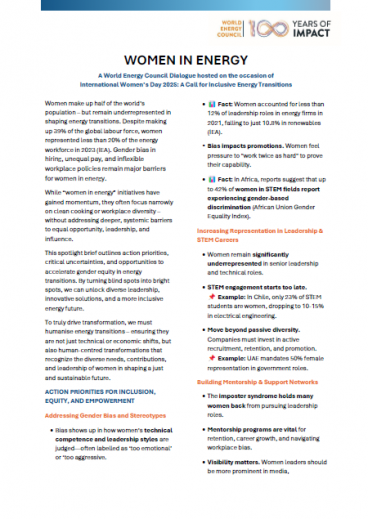We need to talk about and engage each other on energy
In the face of TWO “once in a lifetime” energy shocks
By Paul Appleby, Chief Insights Officer, World Energy Council
We all know energy is essential for our modern lives. Many of us are lucky enough to live in societies where energy supply is generally reliable and affordable. But we tend to take it for granted, until there’s a crisis and the energy isn’t there or it’s suddenly much more expensive. Then the cry goes up for a policy fix.
We are in the grip of multiple energy crises right now. That’s right, more than one.
Consequently, energy is getting a lot of attention. But in a crisis, perspective inevitably narrows; attention focuses on short-term and local fixes, and we look to national governments for national solutions.
The energy system is a complex, global, interconnected, and multi-layered organism that has evolved over many decades. We need to step back from the immediate crisis and take a broad and long-term view, to understand how the energy system is evolving and how it can best adapt to changing circumstances and priorities. The World Energy Council, a worldwide membership community with representatives from all parts of the energy ecosystem and with nearly one hundred years of shared history, is uniquely well-placed to take that broader and longer view of energy.
Let’s wind the clock back to 2019. We had a global energy system that was delivering the goods (and services). It wasn’t perfect. One major flaw was the emission of carbon and other greenhouse gases (GHGs) associated with the production and consumption of energy, putting the world at risk of catastrophic climate change. Another was the very unequal access to energy, which left hundreds of millions of people without the reliable and affordable energy that is necessary to participate productively in the modern economy.
Back then, the challenge for the energy system was framed in terms of the transition to a sustainable and just energy system. And it was a big challenge – the pace and scale of system change required surpassed anything we had seen in history. The opportunity side of the equation was provided by the rapid development of technology – notably digitalisation – which could be deployed to help meet the challenge. The World Energy Council global energy scenarios published at the time explored that landscape of challenge and opportunity.
Since 2019 the global system has been rocked by two “once-in-a-lifetime” shocks in the space of just two years.
First a global public health crisis, the COVID-19 pandemic, which led to the repeated shutdown of large parts of the global energy economy, for extended periods of time. We saw demand destruction like never before. The pandemic shock is likely to have accelerated some pre-existing trends and hastened the demise of some previously inertia-bound practices and processes.
It was clear that societies would face important choices as they recovered from the pandemic – whether to use the crisis to raise their level of ambition for the transformation of the energy system, or to fall back to pre-pandemic priorities; and whether to collaborate more closely through international actions, or to retreat into more isolationist, national-focussed agendas.
The second shock is a global geopolitical crisis, sparked by the military conflict in Ukraine. This crisis is still playing out. It has already caused further spikes in oil and European gas prices. The longer-term risk is that a large chunk of the global energy system is carved out and isolated from the rest of the system. Russia accounts for more than 10% of world oil exports, and nearly 20% of both gas and coal exports.
Disconnecting any country or region from the global energy system would represent a major rupture, with consequences that are impossible to predict given the complexity of the system. There is a further risk that this crisis deepens divisions elsewhere, for example between the USA and China, further fragmenting the system. It is clear that we are not dealing with a single, global energy crisis. There are now three overlapping and interacting global crises at play – the climate crisis, the pandemic crisis and the geopolitical crisis – each of which has critical implications for various parts of the energy system. The result is a series of separate but interlinked local energy crises. It’s no wonder that it feels like a time of extraordinary turbulence in energy.
The simple solutions of the past – leave it all to the market or leave it to national governments to sort out through multilateral negotiations – are no longer adequate. Now more than ever we need an open dialogue, bringing together people from all layers of the energy ecosystem and from across the world, to discuss how to adapt energy systems in the wake of the recent shocks and in anticipation of the energy transition challenges ahead.
That dialogue needs to put people at the heart of the discussion. The system will only adapt as the result of people making choices, both individually and collectively, and thereby changing their relationship with energy. The World Energy Council can provide the platform for that conversation, convening a global safe space under the “humanising energy” vision.
So, we need to talk about energy. And we need talk that leads to impact and action.






_-80_result_688_387_s_c1_c_c.jpg)

